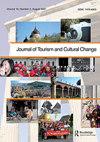从多重危机的影响中恢复道路地图:构建国内自驾游在南澳大利亚地区的作用
IF 2.5
4区 管理学
Q2 HOSPITALITY, LEISURE, SPORT & TOURISM
引用次数: 4
摘要
摘要在南澳大利亚地区,干旱、山火和新冠肺炎疫情的综合影响给旅游经济带来了严峻挑战。由于入境国际旅游业在可预见的未来仍不太可能恢复到新冠肺炎疫情前的水平,国内旅游业的重要性进一步凸显,尤其是在受旅游流量大幅下降影响的地区。这项探索性的定性研究报告了南澳大利亚地区在疫情期间参与国内旅游的情况,以及影响他们旅行方式的因素。我们的研究结果表明,参与者之所以主要从事自驾旅游,是因为与其他交通方式相比,自驾旅游提供了安全感,在促进重新联系和支持幸福方面提供了机会,并且能够唤起积极的感受和围绕冒险和发现构建的情绪。此外,还观察到,自驾游提供了参与无私追求的实际机会,以支持全州受危机影响的地区。因此,本文及时深入了解了南澳大利亚州在疫情期间的行为,以及他们如何利用自驾游来支持个人和社区从全州多重危机的影响中恢复。本文章由计算机程序翻译,如有差异,请以英文原文为准。
Road mapping recovery from the impacts of multiple crises: framing the role of domestic self-drive tourism in regional South Australia
ABSTRACT In regional South Australia, a combination of droughts, bushfires and the COVID-19 pandemic has presented dynamic challenges to tourism economies. As inbound international tourism remains unlikely to return to pre-COVID-19 levels for the foreseeable future, the importance of domestic tourism has become further pronounced, most notably in regions that have been affected by major declines in tourist flows. This exploratory qualitative study reports on regional South Australians’ participation in domestic tourism during the pandemic and the factors that have influenced how they travel. Our findings reveal that participants had predominantly engaged in self-drive tourism due to the feelings of safety it offered in contrast to other modes of transport, the opportunities it permitted in fostering reconnections and supporting wellbeing, and because of its ability to evoke positive feelings and emotions that were structured around adventure and discovery. Moreover, it was additionally observed that self-drive tourism offered practical opportunities to engage in altruistic pursuits to support crisis-affected regions across the state. Therefore, this paper offers timely insights into the behaviours of regional South Australians during the pandemic and how they utilised self-drive tourism to support both personal and community recovery from the impacts of multiple crises across the state.
求助全文
通过发布文献求助,成功后即可免费获取论文全文。
去求助
来源期刊

Journal of Tourism and Cultural Change
HOSPITALITY, LEISURE, SPORT & TOURISM-
CiteScore
5.10
自引率
9.10%
发文量
31
期刊介绍:
Journal of Tourism and Cultural Change ( JTCC ) is a peer-reviewed, transdisciplinary and transnational journal. It focuses on critically examining the relationships, tensions, representations, conflicts and possibilities that exist between tourism/travel and culture/cultures in an increasingly complex global context. JTCC provides a forum for debate against the backdrop of local, regional, national and transnational understandings of identity and difference. Economic restructuring, recognitions of the cultural dimension of biodiversity and sustainable development, contests regarding the positive and negative impact of patterns of tourist behaviour on cultural diversity, and transcultural strivings - all provide an important focus for JTCC . Global capitalism, in its myriad forms engages with multiple ''ways of being'', generating new relationships, re-evaluating existing, and challenging ways of knowing and being. Tourists and the tourism industry continue to find inventive ways to commodify, transform, present/re-present and consume material culture. JTCC seeks to widen and deepen understandings of such changing relationships and stimulate critical debate by: -Adopting a multidisciplinary approach -Encouraging deep and critical approaches to policy and practice -Embracing an inclusive definition of culture -Focusing on the concept, processes and meanings of change -Encouraging trans-national/transcultural perspectives
 求助内容:
求助内容: 应助结果提醒方式:
应助结果提醒方式:


